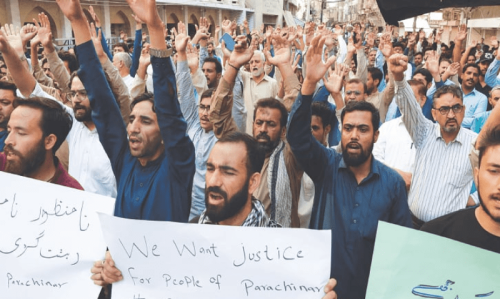ISLAMABAD, Oct 30: Pakistan is unlikely to achieve the 5.5 per cent economic growth target for this fiscal year as it prepares for an IMF stabilisation package and manufacturing and services will be constrained, states a Citigroup market analysis report.
“We project 3.7 per cent growth in gross domestic product of the country,” states the report available with Dawn.
It analyses the currencies, stocks, sovereign debt, local rates records and other economic indicators as on October 27, 2008 of 43 emerging economies from Asia, Latin America, Europe, Africa, Middle East and Euroasia. The report also forecast various economic indicators of these countries for the next two years (2009 and 2010).
In Pakistan, it says food inflation has eased from its 34 per cent year-on-year (YoY) peak in August this year, with headline Consumer Price Index (CPI) at 23.9 per cent in September.
It expects average inflation to peak in March 2009 and average the year at 21.2 per cent. Non-food inflation will continue to rise until early 2009 as subsidies on fuel and power have been eliminated by the government.
“The economic problems facing the country have overshadowed the politics,” it states, adding that Pakistan was unable to secure external assistance from donor countries, but this had more to do with the lack of an underlying stabilisation programme, than political differences between Pakistan and its allies.
“We do not expect much political activity till the outcome of the US presidential elections,” the report states.
Fiscal pressures, the report states, remain the biggest policy challenge facing the country. The fiscal gap in year 2008 was 7.4 per cent of GDP against a target of 4 per cent. The government has projected a sharp reduction in the gap to 4.7 per cent in 2009.
“But, we think this is too ambitious – the IMF is aiming for about 4.3 per cent [fiscal gap],” the report states.
With an IMF Standby Arrangements (SBA) - that is non-concessional loan - likely before this year’s end, there will be lots of pressure to ease spending. Although the IMF should seek another round of monetary tightening, this may not be forthcoming as Pakistan’s banking sector could experience a fresh wave of non-performing loans (NPLs).
The report expects that a slowdown in consumer demand should help ease payment pressure, but the sharp fall in the price of oil will make the real difference. The impact has yet to be felt as the first quarter of the current financial year, which saw the current account deficit almost touched $4 billion against $2.3 billion in the corresponding period last year.
However, with demand management likely to be imposed, the current account gap should fall from $14 billion in 2008 to a more manageable $8-9 billion in 2009.
“We think the IMF will endorse the government’s stabilisation programme,” the report states. But, adds that inflation will continue rising due to fiscal pressures and cut in subsidies.
The report says that risks to Pakistan’s economy are closely related to a number of developments which are in the making including the quantum of the IMF package, and how much of this is front-loaded; commitments from the other international financial institutions (IFIs); hard numbers for the balance of payments and fiscal account for the next two years; bilateral assistance crowded in by the IMF programme; and whether the US steps up its activities in the tribal regions, and how the government and the Pakistan Army responds.














































Dear visitor, the comments section is undergoing an overhaul and will return soon.